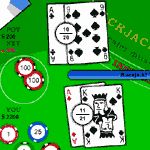BLACKJACK - FREE ONLINE CARD GAMES |
||||
|
||||
|
Blackjack
or 21 Card Game This free Black Jack card game will load in a new window that can be re-sized or enlarged to play full screen. After the game
load: Blackjack, also known as vingt-et-un, twenty-one 21 and pontoon, is one of the most popular casino card games in the world. Much of its popularity is due to the mix of chance with elements of skill and decision making, and the publicity that surrounds the practice of card counting, in which players can turn the odds of the game in their favor by making betting and strategy decisions based on the cards that have been dealt. Casinos strongly frown upon card counting, but it is a difficult skill to master and few players are successful at it. In blackjack,
the players bet against the house dealer rather than against each
other. The goal of each player is to have a higher point total than
the dealer without going over 21. The values of the cards in each
hand are added with 2 through 10 having face value, Ace having value
1 or 11 (player's choice), and King, Jack, and Queen cards having
the value 10. If the player's and the dealer's hands have the same
point value, this is known as a "push", and neither player
wins the hand. If the dealer does not have a natural, then one by one the dealer gives each player the option of asking for more cards (called "taking a hit") or staying with his current total (called "standing" or "holding"). The player may continue to ask for more cards, one by one, until he has either gone over 21 ("a bust"), or he is satisfied with the cards that he has. In addition, depending on what cards the player holds, and depending on the rules in effect at the table, the player may have the option of performing certain special plays (described below). If the player busts (takes a hit that put him over 21), he immediately loses the bet. After all the players have finished making their decisions, the dealer then reveals the hidden "hole" card and may or may not draw additional cards. The decision of whether to draw more cards is not up to the dealer; it depends only on the point total that the dealer holds. If the dealer has fewer than 17, he draws another card, and continues to draw more cards until reaching a value equal to or greater than 17. If the dealer busts, then all remaining players win. Bets are normally paid out at the odds of 1:1. Casino rules vary on whether the dealer takes a hit when holding a "soft" 17 (that is, a hand such as an Ace with a six, which can be counted as either 7 or 17). In Atlantic City, all dealers will stand on a soft 17. In other areas, this is up to the individual casino. Text from Wikipedia the free encyclopedia.
Author: |
||||
